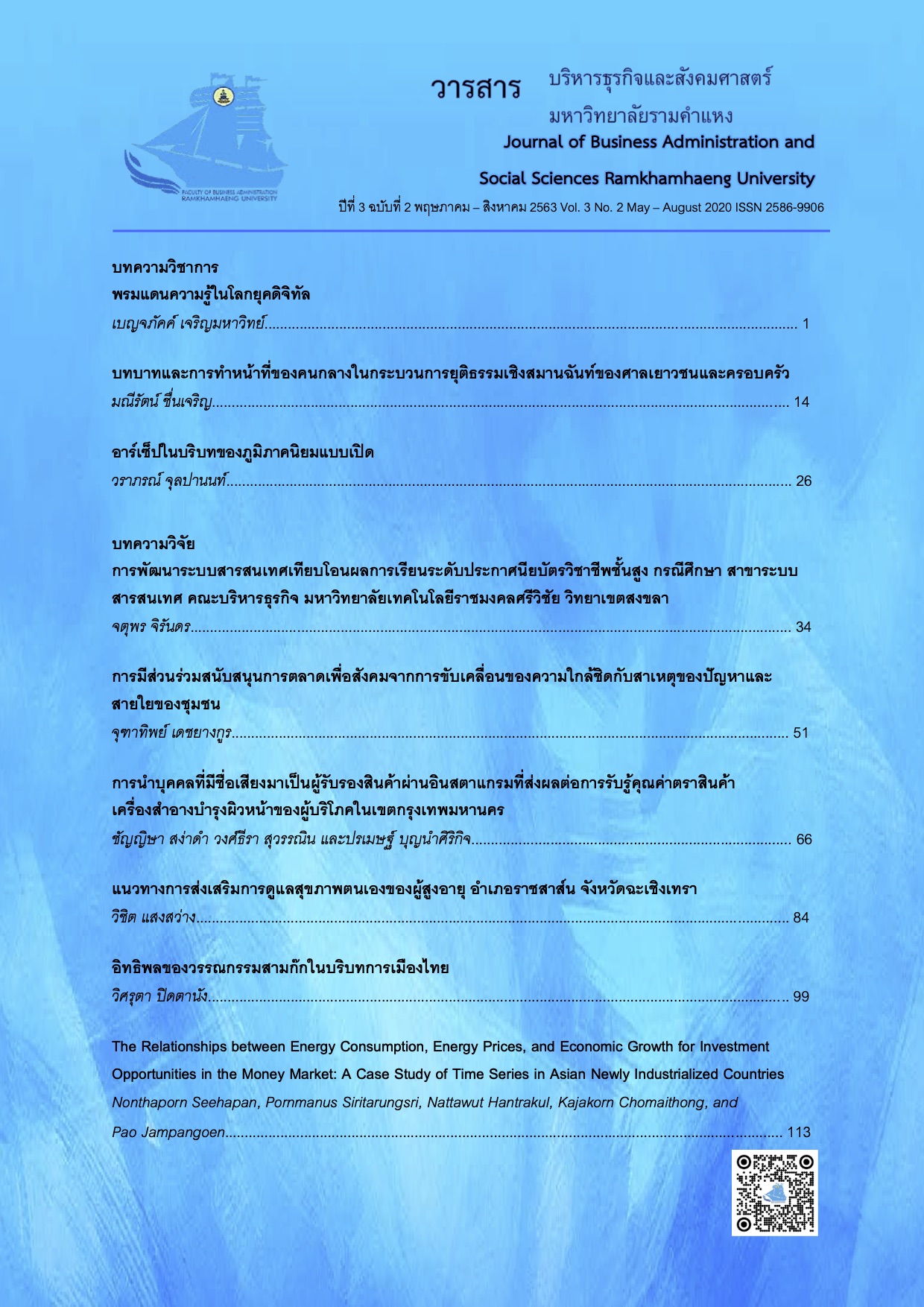บทบาทและการทำหน้าที่ของคนกลางในกระบวนการยุติธรรมเชิงสมานฉันท์ของศาลเยาวชนและครอบครัว
Main Article Content
บทคัดย่อ
บทความนี้มีวัตถุประสงค์เพื่อศึกษาและวิเคราะห์บทบาทและการทำหน้าที่ของคนกลางในกระบวนการยุติธรรมเชิงสมานฉันท์ของศาลเยาวชนและครอบครัว ผลการศึกษาพบว่า ผู้ที่ทำหน้าที่คนกลางในศาลเยาวชนและครอบครัวนั้น จะเป็นผู้พิพากษาสมทบ โดยทำหน้าที่อำนวยความสะดวกและไกล่เกลี่ยความขัดแย้งภายในกระบวนยุติธรรมเชิงสมานฉันท์ และจะถูกเรียกว่าผู้ประสานการประชุม โดยก่อนการประชุม ผู้ประสานการประชุมจะต้องประสานงานและอำนวยความสะดวกระหว่างคู่กรณีในการนัดหมายวัน เวลา และสถานที่ในการประชุม ในระหว่างการประชุม ผู้ประสานการประชุมจะเป็นผู้ดำเนินการประชุมให้แต่ละฝ่ายได้พูดคุยและตกลงกัน เพื่อให้เกิดแผนแก้ไข บำบัด ฟื้นฟูเด็กและเยาวชน และผู้ประสานการประชุมยังต้องติดตามผลการดำเนินงานและจัดทำข้อสรุปเพื่อเป็นรายงานต่อไป อาจถือได้ว่าผู้ประสานการประชุมนั้น มีบทบาทและหน้าที่ในการอำนวยความสะดวกให้คู่กรณีได้เจรจาไกล่เกลี่ยกัน โดยเปิดโอกาสให้ทั้งฝ่ายผู้เสียหาย ฝ่ายผู้กระทำผิด และบุคคลที่ได้รับผลกระทบ ได้เข้ามาพูดคุยถึงสาเหตุในการกระทำความผิด ผลกระทบที่ทางผู้เสียหายได้รับจนนำไปสู่การเยียวยาทั้งทางด้านจิตใจ ค่าเสียหาย และความสัมพันธ์ ทั้งนี้ ผู้ประสานการประชุมจะต้องมีคุณสมบัติคือ เป็นผู้ที่ผ่านการฝึกอบรมหลักสูตรการอบรมและจดแจ้งผู้ประสานการประชุมจัดทำแผนแก้ไข บำบัด ฟื้นฟูเด็กหรือเยาวชน และการชดเชยเยียวยาความเสียหายแก่ผู้เสียหาย และขึ้นทะเบียนและจริยธรรมของผู้ให้คำปรึกษาแนะนำ เพื่อให้กระบวนการเจรจามีการขับเคลื่อนวิธีการไปได้อย่างมีประสิทธิภาพ ตามหลักการกระบวนการยุติธรรมเชิงสมานฉันท์
Article Details
เนื้อหาและข้อมูลในบทความที่ลงตีพิมพ์ในวารสารบริหารธุรกิจและสังคมศาสตร์ มหาวิทยาลัยรามคำแหง ถือเป็นข้อคิดเห็นและความรับผิดชอบของผู้เขียนบทความโดยตรง ซึ่งกองบรรณาธิการไม่จำเป็นต้องเห็นด้วย หรือร่วมรับผิดชอบใดๆ
บทความ ข้อมูล เนื้อหา รูปภาพ ฯลฯ ที่ได้รับการตีพิมพ์ในวารสารบริหารธุรกิจและสังคมศาสตร์ มหาวิทยาลัยรามคำแหง ถือเป็นลิขสิทธิ์ของวารสารบริหารธุรกิจและสังคมศาสตร์ มหาวิทยาลัยรามคำแหง หากบุคคลหรือหน่วยงานใดต้องการนำบทความทั้งหมดหรือส่วนหนึ่งส่วนใดไปเผยแพร่ต่อ หรือเพื่อกระทำการใดๆ จะต้องได้รับอนุญาตเป็นลายลักษณ์อักษรจากวารสารบริหารธุรกิจและสังคมศาสตร์ มหาวิทยาลัยรามคำแหง ก่อนเท่านั้น
เอกสารอ้างอิง
กิตติพงษ์ กิตยารักษ์. (2543). กระบวนการยุติธรรมบนเส้นทางของการเปลี่ยนแปลง (พิมพ์ครั้งที่ 2). กรุงเทพมหานคร: สำนักพิมพ์วิญญูชน.
กิตติพงษ์ กิตยารักษ์. (2544). ยุทธศาสตร์การปฏิรูปกระบวนการยุติธรรมทางอาญาไทย. กรุงเทพมหานคร: สำนักงานกองทุนสนับสนุนการวิจัย.
จุฑารัตน์ เอื้ออำนวย. (2548). กระบวนการยุติธรรมเชิงสมานฉันท์: การคืน “อำนาจ” แก่เหยื่ออาชญากรรมและชุมชน. กรุงเทพมหานคร: สำนักงานกองทุนสนับสนุนการวิจัย.
จุฑารัตน์ เอื้ออำนวย. (2556). ระบบยุติธรรมและยุติธรรมทางเลือก: แนวการวิเคราะห์เชิงสังคมศาสตร์. กรุงเทพมหานคร: สำนักพิมพ์แห่งจุฬาลงกรณ์มหาวิทยาลัย.
ปฐมพร ธาระวานิช. (2552). การนำกระบวนการยุติธรรมเชิงสมานฉันท์มาใช้สำหรับคดีอาญาที่อยู่ในเขตอำนาจของศาลแขวง. วิทยานิพนธ์นิติศาสตรมหาบัณฑิต, จุฬาลงกรณ์มหาวิทยาลัย.
มัวร์, ซี. ดับเบิลยู. (2542). กระบวนการเจรจาไกล่เกลี่ยคนกลาง: ยุทธศาสตร์การนำไปใช้เพื่อแก้ปัญหาความขัดแย้ง (วันชัย วัฒนศัพท์, สุวิทย์ เลาหศิริวงศ์, และวงศา คงดี, ผู้แปล). ขอนแก่น: สถาบันสันติศึกษา มหาวิทยาลัยขอนแก่น.
ศาลเยาวชนและครอบครัวกลาง. (2562). ส่วนมาตรการพิเศษและคุ้มครองสวัสดิภาพ. คู่มือการอบรมและจดแจ้งผู้ประสานการประชุมจัดทำแผนแก้ไข บำบัด ฟื้นฟู เด็กและเยาวชน และการชดเชยเยียวยาความเสียหายแก่ผู้เสียหาย . การประชุมจัดทำแผนแก้ไข บำบัด ฟื้นฟู เด็กและเยาวชน และการชดเชยเยียวยาความเสียหายแก้ผู้เสียหาย 2562. กรุงเทพมหานคร.
อังคณา บุญสิทธิ์, พวงทิพย์ นวลขาว และรัชดา ไชยโยธา. (2549). กระบวนการยุติธรรมเชิงสมานฉันท์กับวัฒนธรรมการระงับข้อพิพาทในท้องถิ่นไทย. กรุงเทพมหานคร: สำนักงานกองทุนสนับสนุนการวิจัย.
อังคนา บุญสิทธิ์. (2550). การจัดการความขัดแย้งในวิถีทางความยุติธรรมเชิงสมานฉันท์. ดุลพาห, 54(3), 207-217.
Braithwaite, J. (1996). Restorative justice and a better future. Dalhousie Review, 76(1), 9-31.
Braithwaite, J. (1998). Restorative Justice. In Michael Tonry (Ed.), The Handbook of Crime & Punishment (pp. 323- 344). Oxford: Oxford University Press.
Roach, K. (2000). Changing punishment at the turn of the century: Restorative justice on the rise. Canadian Journal of Criminology, 42(3), 249-280.
Zehr, H. (2002). The Little Book of Restorative Justice. Pennsylvania: Good Books.


